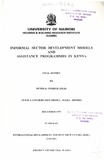Informal sector development models and assistance programmes in Kenya

View/
Date
1995-12Author
Ondiege, Peter O.
Type
OtherLanguage
enMetadata
Show full item recordAbstract
Sub-Saharan Africa had high expectations at the beginning of the 1960s of making rapid progress in raising incomes,employment and improving welfare. A number of these countries successfully expanded the basic infrastructure and social services. However, the beginning of the 1970s saw this initial growth faltering and decline in growth set in. In the 1980s, the situation worsened as the region faced famine, hunger and malnutrition; disintegration of physical infrastructure and social and political instability. Thus the region's economicperformance was particularly dismal since the beginning of the last decade with an average annual growthrate of the GDP of only 0.4% for the region as a whole during the period 1980-1987while per capita incomehad declined by about 2.6% for the same period (UNECA, 1988;World Bank, 1994). The situation hasbeen exacerbated by increasing poverty and disintegration of the productive and infrastructural facilities. Sub-Sahara Africa is experiencing serious deficiencies in basic and social infrastructure, especially the physical
capital, research capabilities, technological know-how and human resources development that are
indispensable to an integrated and dynamic economy. (UNECA, 1986: 4). In the past, African economies have also tended to ignore the Informal/Small Scale Enterprises (I/SSEs) sector which in the middle of the last decade were estimated to account for 20% of total output and over 20% of the total labour force (World Bank, 1989). Estimates by International Labour Organization (ILO) indicate that the I/SSEs sector accounts for 59% of Sub-Saharan Africa's urban labour force. An ILO survey of 17African countries found that the I/SSEs sector contributes, on average, 20% of GDP (or US $15 billion a year) to the economies studied (World Bank, 1989). This sector, which has majority of the poor participating as entrepreneurs, employees and customers plays an important role in production, distribution,
finance and employment creation in the African economies and needs, therefore, to be given serious consideration to help reform-Africa's economic structure (Ondiege, 1992).
Publisher
University of Nairobi
Rights
Attribution-NonCommercial-NoDerivs 3.0 United StatesUsage Rights
http://creativecommons.org/licenses/by-nc-nd/3.0/us/Collections
- Research Reports [210]
The following license files are associated with this item:

